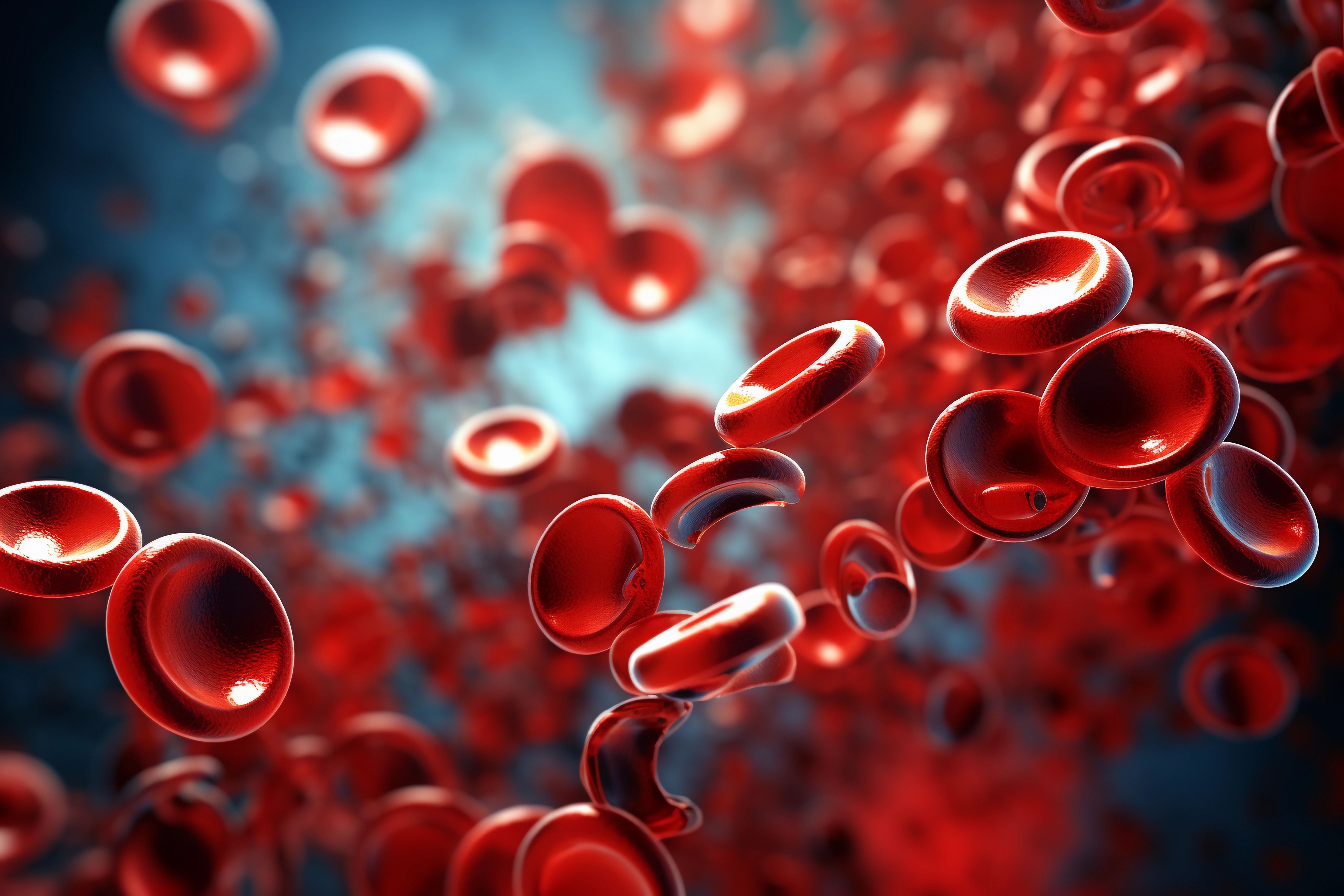- Center on Health Equity & Access
- Clinical
- Health Care Cost
- Health Care Delivery
- Insurance
- Policy
- Technology
- Value-Based Care
Complement Inhibitors may be Ineffective for Reducing Omicron Infection Severity
A single-center study suggests complement inhibitors do not reduce the severity of a COVID-19 Omicron infection in patients with paroxysmal nocturnal hemoglobinuria (PNH).
A COVID-19 infection can worsen hemolytic events in patients with paroxysmal nocturnal hemoglobinuria (PNH). In a recent study published in Annals of Medicine, the COVID-19 vaccine helped reduce the intensity of an Omicron infection and the use of complement inhibitors had a beneficial impact on hemolytic attacks in patients with PNH.
Whole Red Blood Cells | image credit: AI DREAMS - stock.adobe.com

PNH is a clonal hematopoietic stem cell disease characterized by the destruction and hemolysis of red blood cells. The introduction of novel complement inhibitors, such as eculizumab, crovalimab, and iptacopan, has dramatically altered the experienced symptoms, survival, and quality of life for patients with PNH.
Patients with PNH are more vulnerable to hemolytic attacks when they are fighting off infections. For this reason, the COVID-19 pandemic posed a great threat to affected individuals. As the omicron outbreak occurred in China between December 2022 and April 2023, this event also provided researchers with an opportunity to monitor the impact the active epidemic had on the disease course in patients with PNH.
Individuals diagnosed with PNH before the omicron outbreak on December 6, 2022, were retrospectively analyzed. All patients were diagnosed at Peking Union Medical College Hospital (PUMCH) and underwent regular follow-ups until April 2023.
In total, 131 patients were included in the final analysis. Before the start of the study period on December 6, participants experienced a median hemolytic event frequency of 2 hemoglobinuria episodes per year. Along with chronic hemoglobinuria, some patients in the cohort also had histories of different forms of thrombosis, myocardial infarction, and cerebral infarction.
Throughout the study, 27 patients received treatment with complement inhibitors, which included crovalimab (n = 11), iptacopan (n = 10), and CAN106 (n = 6). Forty-one patients received 2 shots of the COVID-19 vaccine at a median period of 9 months prior to the start of the study.
Of the 131 participants, 115 (87.8%) had a new diagnosis of COVID-19 (Omicron) within a month of the start of the study period. Furthermore, the majority of hemolysis events happened in the 2 weeks following an Omicron infection. The authors noted that there were no observed differences—including vaccination status, infection status, or use of complement inhibitors—in the clinical characteristics of the patients. Eighteen (115.7%) of the Omicron cases were classified as severe and the only patients who experienced significantly reduced symptoms during their infection were those who received the vaccination (P = .015).
Until the end of follow-up, 61.8% of patients (n = 81) endured aggravated hemolysis, 2 of which experienced new thrombotic events. In this group, 97.6% (n = 79) had an Omicron infection while the remaining 2.4% (n = 2) did not (P = .00). For those enduring Omicron infection, every patient experiencing severe infection had hemolysis aggravation whereas the non-severe cases had hemolysis aggravation in 62.9% of individuals.
The 115 patients with Omicron infections exhibited significantly increased levels of lactate dehydrogenase (LDH) compared with those who were not infected (P = .00). Additionally, cases of severe infection exhibited even higher levels compared with uninfected individuals (P = .002).
Patients who received complement inhibitors overall experienced less intense hemolytic events compared with treatment-naïve patients (P = .003). Thirty-seven percent (n = 10) of patients in the treatment group also developed breakthrough hemolysis (BTH).
“Contrary to expectations, our study indicated that complement inhibitors do not substantially protect against infection severity,” the authors wrote.
While complement inhibitors did help mitigate the severity of hemolytic events, the COVID-19 vaccine was the primary factor in reducing the severity of infections.
Reference
Wang L, Hu Q, Yang Y, Chen M, Yang C, Han B. COVID-19 vaccination prevents a more severe course and treatment with complement inhibitors reduce worsening hemolysis during the omicron pandemic in patients with PNH: A single-center study. Ann Med. 2023;55(2):2274510. doi: 10.1080/07853890.2023.2274510
